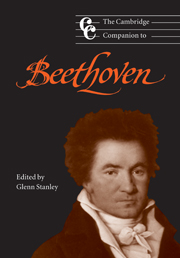Book contents
- Frontmatter
- Part I A professional portrait
- Part II Style and structure
- Part III Genres
- 7 The piano music: concertos, sonatas, variations, small forms
- 8 Beethoven's chamber music with piano: seeking unity in mixed sonorities
- 9 Manner, tone, and tendency in Beethoven's chamber music for strings
- 10 Sound and structure in Beethoven's orchestral music
- 11 Beethoven's songs and vocal style
- 12 Beethoven's essay in opera: historical, text-critical, and interpretative issues in Fidelio
- 13 Probing the sacred genres: Beethoven's religious songs, oratorio, and masses
- Part IV Reception
- Notes
- Selected further reading
- General index
- Index of Beethoven’s compositions and sketches
- Plate section
12 - Beethoven's essay in opera: historical, text-critical, and interpretative issues in Fidelio
from Part III - Genres
Published online by Cambridge University Press: 28 September 2011
- Frontmatter
- Part I A professional portrait
- Part II Style and structure
- Part III Genres
- 7 The piano music: concertos, sonatas, variations, small forms
- 8 Beethoven's chamber music with piano: seeking unity in mixed sonorities
- 9 Manner, tone, and tendency in Beethoven's chamber music for strings
- 10 Sound and structure in Beethoven's orchestral music
- 11 Beethoven's songs and vocal style
- 12 Beethoven's essay in opera: historical, text-critical, and interpretative issues in Fidelio
- 13 Probing the sacred genres: Beethoven's religious songs, oratorio, and masses
- Part IV Reception
- Notes
- Selected further reading
- General index
- Index of Beethoven’s compositions and sketches
- Plate section
Summary
Despite its familiarity, its secure place in the operatic canon, and the large body of literature that surrounds it, Beethoven's Fidelio continues to pose challenges to interpretation and understanding. Its complicated genesis, performance history, and transmission present troublesome philological questions that in certain cases may never be fully resolved. And its position as the sole opera of a composer known primarily for his instrumental music makes it a difficult work to place within the context of his artistic development. But if Fidelio is nearly as much a problem for critics and scholars as it was for the composer himself, it is also a central work, an understanding of which is crucial for any attempt to comprehend Beethoven's ambitions and accomplishments, his self-critical spirit, and his world-view.
Whose Fidelio ? the historical background and the textual problem
The complex text-critical issues that surround Fidelio are perhaps best approached through a review of the biographical circumstances that led to its creation and revisions. In 1803 Beethoven accepted a commission for a new opera from Emmanuel Schikaneder, the impresario of the Theater an der Wien, who himself provided the composer with a libretto entitled Vestas Feuer. Beethoven began to compose Schikaneder's text in the autumn of that year, but he quickly abandoned it; by early January 1804 he had decided to have an extant French libretto, Jean-Nicolas Bouilly's Léonore, ou L'amour conjugal, adapted into German by Joseph Sonnleithner.
- Type
- Chapter
- Information
- The Cambridge Companion to Beethoven , pp. 200 - 217Publisher: Cambridge University PressPrint publication year: 2000
- 2
- Cited by



